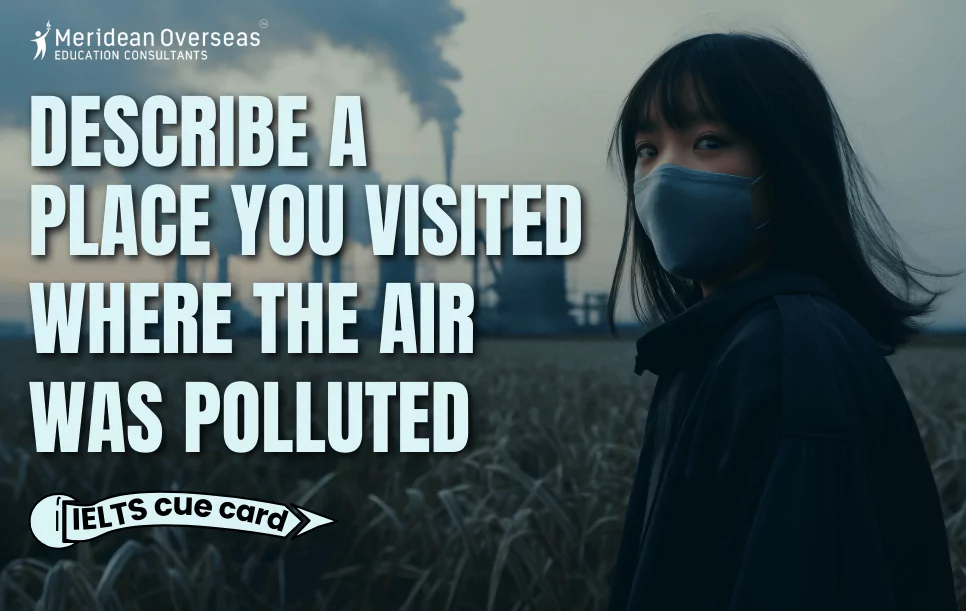
Meridean Overseas
Updated On 27 April 2024 & Read Time 7 minutes
6.4k
The IELTS speaking test is classified into three segments: an introduction, a discussion of a specific topic, and a more in-depth discussion. During the test, the examiner checks your Fluency and Coherence, Grammar and Lexical Resources and among other factors. In Part 2, you select a card within the given topics and discuss it for two to three minutes.
One of the most prevalent cue card topics is "Describe a place you visited where the air was polluted." So, let us give some instances of responses to this topic on this blog.
Table of Contents
Here is the cue card sample response for the “Describe a place you visited where the air was polluted” topic.
Well, I would like to talk about Noida City, which is located in the NCR region in India. I visited Noida about a year ago.

It was during the winter season, around December, when I went there.
The air quality in Noida wasn't good mainly because of the heavy traffic, industrial activities, and agricultural burning in nearby regions. These factors contribute to high levels of air pollution, especially during the winter when atmospheric conditions worsen the situation.
I felt pretty uncomfortable being in Noida because of the polluted air. It was visible in the form of smog hanging over the city, and I could feel the effects, like irritation in my throat and difficulty in breathing. It made outdoor activities less enjoyable and I was constantly worried about the health implications of breathing in such polluted air.
Visiting Noida was a bit disheartening due to the poor air quality. It's concerning to see how air pollution can affect the human health and environment as well as the well-being of people living in such areas.
Also, Read: Describe a Happy Experience from Your Childhood That You Remember
Here is the cue card sample answer for the “Describe a place you visited where the air was polluted” topic.
I want to share my experience visiting Zgierz, a town in Poland, during a trip to Poland last summer.
It was in July, during the summer holidays, when I explored Zgierz.
The air quality in Zgierz wasn't very good. The reason behind this is various industrial activities. Several factories and industrial plants nearby emit pollutants into the air, leading to poor air quality.
I was disappointed about the air quality in Zgierz. When I arrived, I noticed a haze in the air, and there was a distinct smell of chemicals lingering around. Knowing that I was breathing in polluted air made me feel uneasy. I could feel it in my throat, making me cough a bit. Unfortunately, Zgierz has some beautiful sights and attractions, but the pollution detracted from the overall experience.
In conclusion, the poor air quality overshadowed my visit to Zgierz. It's concerning to see how industrial activities can affect the surroundings and human health in the area.
Also, Read: Describe a volunteering experience you have had
Embark and excel in your study abroad journey with our expert team!

Check the follow-up questions for “Describe a place you visited where the air was polluted” in the cue card section.
Q1. Is there more pollution now than in the past?
Ans. Yes, the population has increased in recent years, and there used to be less pollution earlier. Many people are buying cars, which add considerably to air pollution which makes it harder for the young and old to breathe, and have long-term health consequences.
Q2. Do you think the city is cleaner or dirtier than the countryside? Why?
The perception of whether a city or countryside is cleaner varies depending on various factors. Cities often have higher concentrations of pollutants due to traffic, industrial activities, and dense populations. However municipalities may also have more stringent regulations and resources to manage pollution. In contrast, the countryside may have fewer sources of pollution but could still face issues like agricultural runoff and waste disposal challenges. Ultimately, it depends on specific locations and the effectiveness of pollution management measures.
Q3. How can air pollution be reduced effectively?
Ans. To reduce air pollution effectively, we can do the following -
Implement stricter emission standards for vehicles and industries.
Encourage the adoption of cleaner technologies in manufacturing processes.
Enhancing public transportation systems to reduce reliance on personal vehicles.
Implement green building practices to reduce energy consumption.
Increase public awareness about the harmful effects of air pollution and encourage individuals to take actions like reducing vehicle idling and using energy-efficient appliances.
Q4. What can power plants or factories do to reduce pollutants?
Ans. Factories and power plants can embrace various practices to reduce pollutants, such as -
Use pollution control devices such as scrubbers and filters to reduce emissions.
Invest in cleaner energy sources and technologies like natural gas or renewable energy.
Implement energy efficiency measures to reduce overall emissions.
Monitor and optimise production processes to minimise waste and emissions.
Implementing waste management programs to reduce environmental impact.
Q5. Do you think the wind has any effect on pollution? How?
Ans. Wind can affect pollution in positive and negative ways. Wind can help disperse pollutants, reduce local concentrations and improve air quality in some areas. However, wind can also transport pollutants long distances, leading to regional or global pollution problems. Additionally, weather conditions, such as temperature inversions, can trap pollutants near the ground, exacerbating air quality issues despite wind movement. Overall, wind plays a significant role in the spread of pollutants in the atmosphere.
Q6. What do you think - many companies have been forced to reduce pollutants?
Ans. In recent years, companies have been increasingly pressured to reduce pollutants due to growing environmental awareness, stricter regulations, and consumer demand for sustainable products. Many companies have voluntarily adopted measures to reduce their environmental footprint, while others have been mandated to do so through regulations and legal enforcement.
Also, Read: Describe an Occasion When You Lost Your Way
With the above sample answers, you are aware of how to answer “Describe a place you visited where the air was polluted” if you get this topic. We hope our series of IELTS Speaking Cue Card topics will be helpful for you in preparing the best cue cards.
We hope you prepared to answer the question “Describe a place you visited where the air was polluted '' in your IELTS speaking test. If you want to get further details or would like to prepare for IELTS, you can contact our expert counsellors at Meridean Overseas Education Consultants (MOEC). You can also take free online counselling through our website. Our expert counsellors will provide you with the best support and guidance you need for admission and visa. In addition, they will help you shortlist the universities according to your profile. For more information or any queries, contact application02@meridean.org or 1800-1230-00011.
Boost your IELTS score with effective practice using these sample papers.
Get Your Free Guide

Contact MOEC Experts for Study Abroad Guidance!
Contact MOEC Experts for Study Abroad Guidance!

